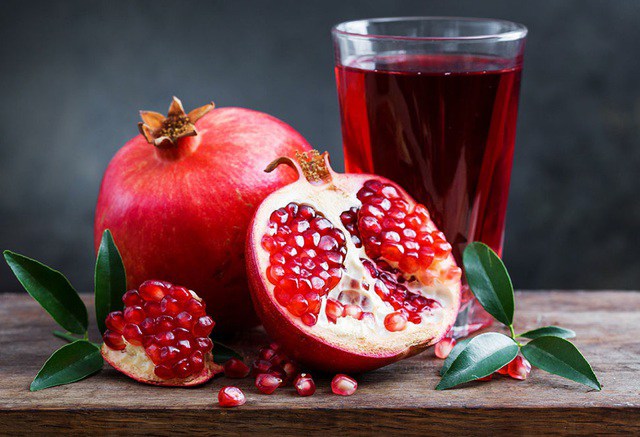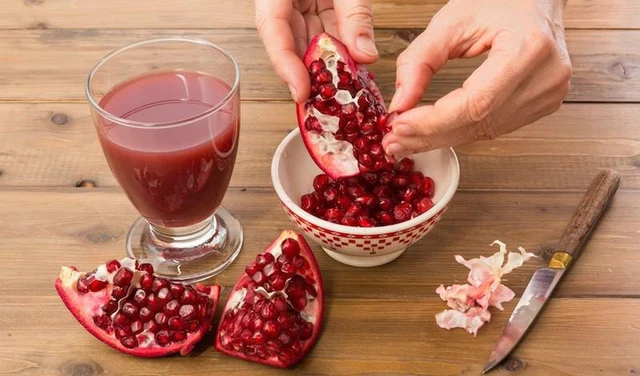Pomegranate juice is a fruit juice that is rich in polyphenols with high antioxidant capacity. This is the reason why research has found its great benefits for human health, especially cardiovascular health.
1. Pomegranates are exceptionally high in antioxidants
Pomegranates are a fruit rich in vitamins, minerals, fiber, and antioxidants. Pomegranate nutrition may help treat risk factors for many diseases, including high blood pressure, high cholesterol, oxidative stress, hyperglycemia, and inflammatory markers.
According to a nutritional analysis, one pomegranate (about 282g) provides 234 calories, 4.7g protein, 52.7g carbohydrates, and 3.3g fat. Pomegranate seeds are a very good source of fiber and are rich in potassium, phosphorus, magnesium, and calcium.
Pomegranate is particularly rich in polyphenol antioxidants, especially in its juice. Pomegranate juice contains higher levels of antioxidants than many other fruit juices, and it contains nearly three times more antioxidants than green tea or red wine.

Pomegranates are rich in vitamins, minerals and antioxidants.
One cup of pomegranate juice contains approximately:
- Calories: 134
- Total carbohydrates: 32.6g
- Fiber: 0.2g
- Sugar: 31.4g
- Total fat: 0.7g
- Protein: 0.4g
- Sodium: 22.4mg (1% DV)
- Vitamin K : 25.9mcg (22% DV)
- Folate: 59.8mcg (15% DV)
- Potassium: 533mg (11% DV)
- Copper: 0.1mg (11% DV)
- Manganese: 0.2mg (9% DV)
- Vitamin E : 0.9mg (6% DV)
- Vitamin B6: 0.1mg (6% DV)
- Magnesium: 17.4mg (4% DV)
- Niacin: 0.6mg (4% DV)
- Calcium: 27.4mg (2% DV)
- Phosphorus: 27.4mg (2% DV)
2. How does pomegranate juice benefit heart health?
Pomegranate juice is a fruit juice rich in polyphenols, which have high antioxidant properties. Polyphenols help protect the body and neutralize free radicals that damage cells. Without antioxidants to neutralize free radicals, cells become damaged, increasing the risk of diseases such as diabetes , heart disease , and cancer.
Therefore, adding polyphenol antioxidants to your diet can improve heart health and reduce the risk of heart disease.
Polyphenols can improve many risk factors for heart disease, including: Lowering blood pressure, lowering LDL cholesterol (bad cholesterol), increasing HDL cholesterol (good cholesterol), and preventing blood clots.
Because pomegranate juice is rich in antioxidants, it has prompted research into its effects on cardiovascular health. In limited studies in human and mouse models, pomegranate juice has been shown to have significant anti-atherosclerotic, antioxidant, antihypertensive, and anti-inflammatory effects.
Pomegranate juice significantly reduces atherosclerotic lesions in immunodeficient mice and intima-media thickness in patients with heart disease taking medication. It also reduces lipid peroxidation in patients with type 2 diabetes, and systolic blood pressure and serum angiotensin-converting enzyme activity in patients with hypertension.
Small studies appear to suggest that drinking pomegranate juice may lower cholesterol, but overall the evidence is unclear. It is thought that pomegranate juice may prevent or slow the buildup of cholesterol in the arteries of people at risk of heart disease. According to research, the antioxidants in pomegranate juice may help keep cholesterol in a less harmful form and may also reduce plaque buildup in the arteries.
In a study of healthy men, researchers from Israel concluded that pomegranate juice reduced LDL (the type of cholesterol that forms plaque) and improved HDL (the good cholesterol).
Other studies have shown that drinking pomegranate juice regularly improves cardiovascular risk factors, slows the progression of plaque buildup in the arteries, and boosts immunity. However, more in-depth clinical studies are needed to know exactly how pomegranate juice can benefit cardiovascular health, and it is also important to note how to use pomegranate juice effectively and safely.

Use pure, unsweetened pomegranate juice.
3. How to use pomegranate juice safely
Eating fruit and drinking fruit juice is part of a healthy diet. However, to be safest and get the most nutritional benefits from pomegranates, you should choose fresh pomegranates and store them properly. You can keep pomegranates at room temperature for a week or in the refrigerator for 1 month. If the seeds have been removed, they need to be stored in the refrigerator.
Fresh pomegranate seeds usually last in the refrigerator for up to 3 days. If you have squeezed them but do not drink them all, you need to freeze them to preserve the flavor. You should drink 100% pure pomegranate juice and do not add sugar.
It should be noted that you should not abuse any type of fruit juice, including pomegranate juice, especially for people with diabetes because drinking a lot of juice also means consuming a higher sugar content.
Because pomegranate juice can affect blood pressure, people with symptoms of low blood pressure should be careful. People who are allergic to pomegranates should avoid consuming pomegranate juice, pomegranate seeds, and other foods and beverages that contain pomegranates.





